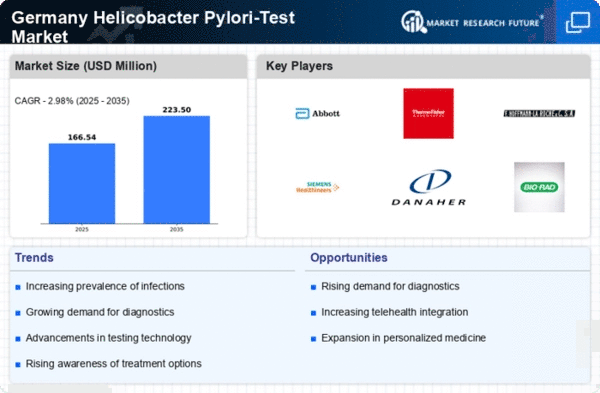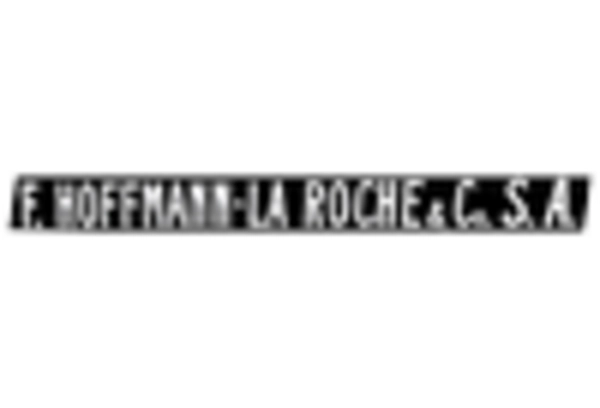Increased Healthcare Expenditure
The rise in healthcare expenditure in Germany is a notable driver for the helicobacter pylori-test market. With the government and private sectors investing more in healthcare services, there is a growing allocation of funds towards diagnostic testing. This increase in financial resources allows healthcare facilities to upgrade their testing capabilities and adopt the latest technologies. Reports indicate that healthcare spending in Germany has grown by approximately 4% annually, which is likely to continue. As healthcare providers enhance their diagnostic services, the demand for helicobacter pylori testing is expected to rise, thereby propelling the helicobacter pylori-test market forward.
Growing Focus on Preventive Healthcare
The increasing emphasis on preventive healthcare in Germany is a significant driver for the helicobacter pylori-test market. As healthcare systems shift towards proactive measures, the demand for early detection of potential health issues, including Helicobacter pylori infections, is rising. Preventive testing is becoming a standard practice, with healthcare providers recommending routine screenings for at-risk populations. This trend is supported by public health campaigns aimed at educating the population about the risks associated with untreated infections. The helicobacter pylori-test market stands to gain from this focus on prevention, as more individuals seek testing to mitigate health risks and enhance their overall well-being.
Advancements in Diagnostic Technologies
Technological innovations in diagnostic testing are significantly influencing the helicobacter pylori-test market. The introduction of non-invasive testing methods, such as breath tests and stool antigen tests, has made it easier for healthcare providers to diagnose infections accurately. These advancements not only enhance patient comfort but also improve testing efficiency, leading to quicker results. In Germany, the adoption of these modern diagnostic tools is on the rise, with a reported increase in the use of breath tests by over 20% in recent years. This shift towards advanced testing technologies is likely to drive the helicobacter pylori-test market forward, as healthcare facilities seek to implement the latest solutions to meet patient needs and improve healthcare outcomes.
Regulatory Support for Diagnostic Testing
Regulatory frameworks in Germany are increasingly supportive of diagnostic testing, which positively impacts the helicobacter pylori-test market. The German Federal Institute for Drugs and Medical Devices (BfArM) has established guidelines that facilitate the approval and use of new testing methods. This regulatory support encourages innovation and the introduction of advanced diagnostic tools into the market. As a result, manufacturers are more likely to invest in research and development, leading to a broader range of testing options for healthcare providers. The helicobacter pylori-test market is expected to benefit from this favorable regulatory environment, as it fosters competition and enhances the availability of effective testing solutions.
Rising Incidence of Helicobacter Pylori Infections
The increasing prevalence of Helicobacter pylori infections in Germany is a crucial driver for the helicobacter pylori-test market. Studies indicate that approximately 30-40% of the German population may be infected with this bacterium, which is linked to various gastrointestinal disorders, including peptic ulcers and gastric cancer. This rising incidence necessitates effective diagnostic testing, thereby propelling market growth. As healthcare providers emphasize early detection and treatment, the demand for reliable testing methods is expected to surge. Furthermore, the growing awareness among patients regarding the health implications of untreated infections contributes to the market's expansion. The helicobacter pylori-test market is likely to benefit from this trend, as more individuals seek testing to confirm or rule out infections.
















